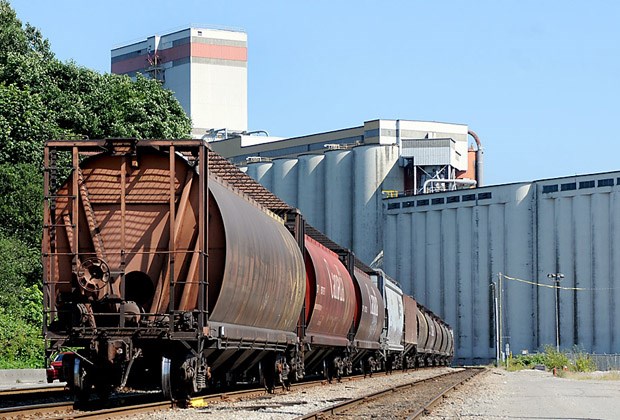Port Metro Vancouver isn't prepared to commit to a full-blown health impact assessment for its expansion projects on the North Shore as requested by the City of North Vancouver.
But the port's management is willing to co-operate and share study data to help assuage public concerns.
Residents who live near the Low Level Road are having to contend with the expansion of Neptune's coal export terminal and Richardson's grain silos as well as more rail lines and train traffic. But the projects were approved by Port Metro Vancouver without first showing the neighbouring residents what it would mean for their health.
Vancouver Coastal Health's chief public health officer Dr. Patricia Daly sat in on a recent meeting of the Low Level Road and Port Area Community Liaison Committee and joined in the call for more scrutiny.
"I was asked whether I would recommend a study be done and the answer is yes," Daly said. "In order to answer the public's questions about whether there are any potential impacts for health from the expansion of the coal terminal at the port, there would need to be a study."
The port commissioned its own environmental assessments before allowing the expansion projects, but the data in those studies hasn't been analyzed by the health authority and there may be gaps in the methodology, Daly said.
Paying for any further study, reporting or follow up should come from the coffers of the projects' proponents, she added.
"We're not talking about millions of dollars or hundreds of thousands of dollars. It just needs to be able to answer some key questions and use appropriate data," she said.
But many of the answers the city, health authority and the public are seeking are contained in the environmental assessments, which showed no heightened risk from port expansion, said Darrell Desjardin, the port's director of environmental programs.
"Those projects did go through an environmental assessment that did include an assessment of the projects' impacts on human health, which were focused on air quality, noise and light," Desjardin said. "For those projects that already exist, we say we've done that work."
The Canadian Environmental Assessment Act of 2012, which Port Metro Vancouver and its tenants are subject to, requires proponents demonstrate their projects have no significant adverse environmental effects.
Although there are no plans to "re-open" the original environmental assessment studies, the port would be glad to share the data and invite Vancouver Coastal Health to join in monitoring and analyzing data collected, Desjardin said.
"If (the health authorities) want to participate in the followup monitoring and compare the measured concentrations to assess human health risks, we've said we're perfectly open to that," he said. "What we've said is we're going to be open and transparent. We're going to share the results of the air quality monitoring and the noise monitoring to demonstrate that these projects are either resulting in a decrease of air emissions or, in the case of noise, being neutral."
The term "health impact assessment" is relatively new in Canada and there are no set standards on how one should be conducted, Desjardin said.
Generally, he said, they are understood to look at health impacts, taking into account more than just emissions or particulate, but also how the project fits into the health of the wider community including what benefits it may bring economically.
The news comes as a disappointment to committee chairman Tony Valente.
"If they're not going to do it and they're not going to do what council and our committee has requested, it sounds like they're going to have a difficult time giving Dr. Daly the tools that she needs to answer the people's questions about 'what are the impacts of this on public health?' he said.
"They have done a lot of great work but I think people want to know the answer to that question."



